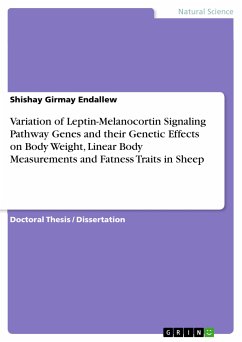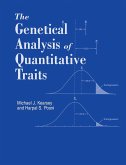Doctoral Thesis / Dissertation from the year 2019 in the subject Biology - Genetics / Gene Technology, grade: Very good, , language: English, abstract: This thesis focuses on examining the genetic effects of leptin-melanocortin signaling pathway genes, specifically MC4R, STAT3, and LEP, on body measurement and fatness traits in sheep. The study recognizes that an animal's phenotype performance for a specific trait is influenced by both its genetic merit and the environmental factors it experiences. To improve genetic traits in sheep, it is crucial to define the genetic component associated with the trait of interest. The research identifies major genes within the leptin-melanocortin signaling pathway that significantly impact growth and lean meat production. The study utilizes various techniques such as bioinformatics tools, Polymerase Chain Reaction (PCR) direct sequencing, General Linear Models (GLM), immunohistochemistry (IHC), and promoter region analysis to investigate the variations, structure, function, and expression of these genes in different tissues of sheep. While studies have begun to gain insight into chromosomal locations that regulate economically valuable traits in sheep, much unearthing works remained to be done regarding the generation of practical genomics information that can be applied to genetic improvement of reproduction, disease resistance, production, and carcass quality traits in sheep. Although preceding researchers have reported SNPs in the major genes of the leptin-melanocortin signaling pathway, including the MC4R and LEP has reported an association with various economically important traits in sheep. The effect of the STAT3 genotypes on body weight and fatness in sheep is not determined. Moreover, the association of variants in the promoter region of the MC4R gene with the economically important traits and the promoter region of the gene was not delineated. So, this study was crucial to enlighten these research gaps.
Dieser Download kann aus rechtlichen Gründen nur mit Rechnungsadresse in A, B, BG, CY, CZ, D, DK, EW, E, FIN, F, GR, HR, H, IRL, I, LT, L, LR, M, NL, PL, P, R, S, SLO, SK ausgeliefert werden.









